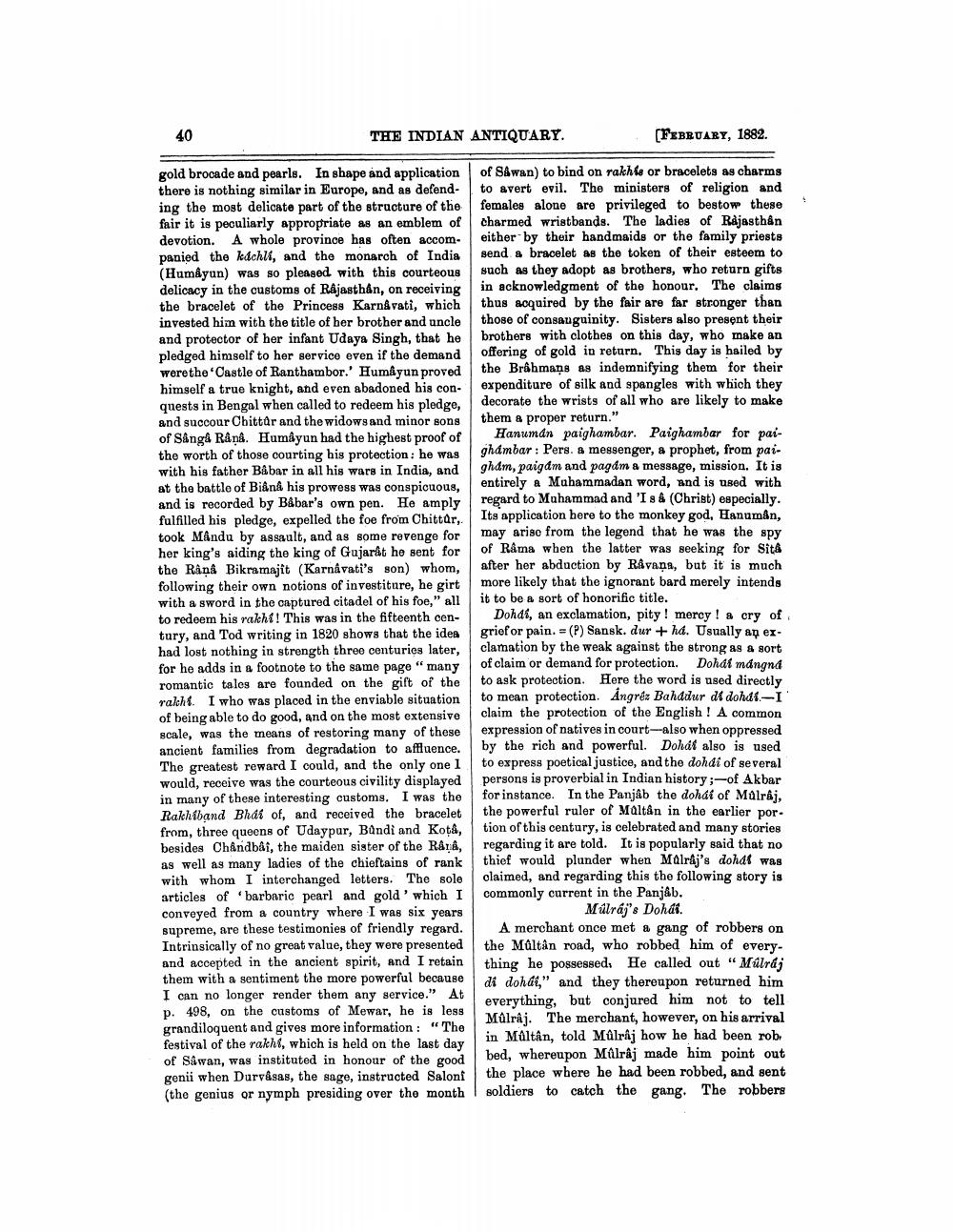________________
40
THE INDIAN ANTIQUARY.
(FEBRUARY, 1882.
gold brocade and pearls. In shape and application of SAwan) to bind on rakhte or bracelets as charms there is nothing similar in Europe, and as defend- to avert evil. The ministers of religion and ing the most delicate part of the structure of the females alone are privileged to bestow these fair it is peculiarly appropriate as an emblem of charmed wristbands. The ladies of Rajasthan devotion. A whole province has often accom- either by their handmaids or the family priests panied the kachu, and the monarch of India send a bracelet as the token of their esteem to (Humayun) was so pleased with this courteous such as they adopt as brothers, who return gifts delicacy in the customs of Rajasthån, on receiving in acknowledgment of the honour. The claims the bracelet of the Princess Karnavati, which thus aoquired by the fair are far stronger than invested him with the title of her brother and uncle those of consanguinity. Sisters also present their and protector of her infant Udaya Singh, that he brothers with clothes on this day, who make an pledged himself to her service even if the demand offering of gold in return. This day is hailed by were the 'Castle of Ranthambor.' Humayun proved
the Brahmans as indemnifying them for their himself a true knight, and even abadoned his con- expenditure of silk and spangles with which they quests in Bengal when called to redeem his pledge, decorate the wrists of all who are likely to make and succour Chittar and the widows and minor song them a proper return." of Sanga Rånå. Humayun had the highest proof of
1 Hanumdn paighambar. Paighambar for paithe worth of those courting his protection: he was
ghambar: Pers. & messenger, & prophet, from pai. with his father Båbar in all his wars in India, and ghdm, paigam and pagam a message, mission. It is at the battle of Bianâ his prowess was conspicuous,
entirely a Muhammadan word, and is used with and is recorded by B&bar's own pen. He amply
regard to Muhammad and 'I s & (Christ) especially. fulfilled his pledge, expelled the foe from Chittar, Its application here to the monkey god, Hanuman, took Mându by assault, and as some revenge for may arise from the legend that he was the spy her king's aiding the king of Gujarat he sent for
of Råma when the latter was seeking for Sitâ the Rånå Bikramajit (Karnavati's son) whom, after her abduction by Råvang, but it is much following their own notions of investiture, he girt more likely that the ignorant bard merely intends with a sword in the captured citadel of his foe," all it to be a sort of honorific title. to redeem his rakht! This was in the fifteenth cen- Doha, an exclamation, pity! mercy! a cry of tury, and Tod writing in 1820 shows that the idea grief or pain. = (P) Sansk. dur + hd. Usually an ex. had lost nothing in strength three centuries later, clamation by the weak against the strong as a sort for he adds in a footnote to the same page "many of claim or demand for protection. Dohai mdngnd romantic tales are founded on the gift of the to ask protection. Here the word is used directly rakht. I who was placed in the enviable situation to mean protection. Angrez Bahddur d dohdi.-I of being able to do good, and on the most extensive claim the protection of the English ! A common scale, was the means of restoring many of these expression of natives in court--also when oppressed ancient families from degradation to affluence.
by the rich and powerful. Dohal also is used The greatest reward I could, and the only one 1 to express poetical justice, and the dohai of several would, receive was the courteous civility displayed persons is proverbial in Indian history;-of Akbar in many of these interesting customs. I was the for instance. In the Panjab the dohái of Malraj, Rakhiband Bhai of, and received the bracelet the powerful ruler of Maltan in the earlier porfrom, three queens of Udaypur, Bundi and Kota, tion of this century, is celebrated and many stories besides Chåndbãi, the maiden sister of the Rara, regarding it are told. It is popularly said that no as well as many ladies of the chieftains of rank thief would plunder when Malraj's dohat was with whom I interchanged letters. The sole claimed, and regarding this the following story is articles of barbaric pearl and gold' which I commonly current in the Panjab. conveyed from a country where I was six years
Múlráj's Dohái. supreme, are these testimonies of friendly regard. A merchant once met a gang of robbers on Intrinsically of no great value, they were presented the Moltán road, who robbed him of everyand accepted in the ancient spirit, and I retain
thing he possessed. He called out "Maird; them with a sentiment the more powerful because
di dohai," and they thereupon returned him I can no longer render them any service." At
everything, but conjured him not to tell p. 498, on the customs of Mewar, he is less grandiloquent and gives more information : "The
Múlraj. The merchant, however, on his arrival festival of the rakht, which is held on the last day
in Multân, told Mûlraj how he had been rob of Sawan, was instituted in honour of the good
bed, whereupon Múlraj made him point out genii when Durvasas, the sage, instructed Salon the place where he had been robbed, and sent (the genius or nymph presiding over the month soldiers to catch the gang. The robbers




